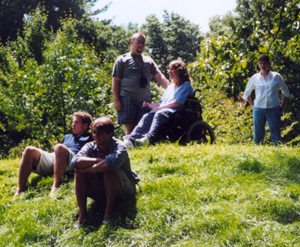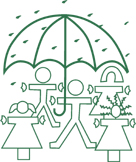Past as Prologue
ICAD emerged from a long history of experiences by the director, Sebastiano
Santostefano, Ph.D., ABPP and his colleagues. Dr. Santostefano brings
extensive experience as a practicing clinical psychologist and psychoanalyst,
university professor, researcher and author.
For twenty years, he held the position of Director of the Department
of Child and Adolescent Psychology and Psychoeducation, at McLean Hospital,
as well as Associate Professor of Psychology, Department of Psychiatry,
Harvard Medical School. Prior to this, he held faculty appointments
and directed clinical programs at Boston University Medical School,
Clark University and the University of Colorado Medical Center.
An overview of past programs and experience may serve the reader in
learning how pieces of the past fit together to shape the present.
1960-1967
The Beginnings
At the University of Colorado Medical Center, Dr. Santostefano worked
with children at a state orphanage and on Native American reservations
providing the theoretical and methodological basis for diagnostic tools
and treatment methods. These diagnostic tools have been intensively
researched not only by Santostefano's team but also by a large number
of independent professionals in the field. The diagnostic tools have
evolved and increased in number and are the instruments currently used
by ICAD.
In 1964 while on the faculty of Clark University and the Worcester
Youth Guidance Center, Dr. Santostefano and his colleagues trained mothers
of retarded and emotionally disturbed children to provide specialized
treatment at home. A publication of this program was awarded a prize
by the American Rehabilitation Association as one of the "top twenty"
research reports. They also published a study of how the violent accidental
death of a parent affects academic and emotional development in children.
This publication was an impetus for ICAD's research on how life stressors
affect development.
1967-1979
Growth in Ideas and Application
In the late 1960's, Dr. Santostefano and his colleagues, then on the
faculty of Boston University Medical School, created and directed a
pre-school/day care program in Roxbury, Massachusetts serving children
3-6 years old of African-American and Hispanic origin. In one unique
feature of this program, mothers from the community were trained in
techniques of special education, cognitive development, and child management.
A number of these mothers went on to take college courses, and two went
on to receive graduate degrees, convincing Dr. Santostefano that training
paraprofessionals was an extremely worthwhile endeavor.
In the spring of 1972, Dr. Santostefano was appointed Director of The
Department of Child and Adolescent Psychology and Psychoeducation, McLean
Hospital and Associate Professor of Psychology, Department of Psychiatry,
Harvard Medical School. In addition, in 1977 Santostefano founded Cognitive
Therapy and Diagnostic Service (CTDS), Wellesley, Massachusetts, a for-profit
group practice. The mission of CTDS was to make available to an outpatient
population the same diagnostic tools and treatment methods that had
evolved form earlier work at the University of Colorado Medical School.
1980-1991
New Challenges
During the early 1980's, Dr. Santostefano, while Director of the Department
of Child and Adolescent Psychology at McLean Hospital, observed with
his colleagues that, at times, life stressors had so impacted children
that they required prolonged hospitalization in a psychiatric facility.
In addition, the use of medication, as a means to resolve a child's
difficulties, was increasing, as well as the dramatic shift in the medical
insurance industry. Insurance companies and health maintenance organizations
began to set limits on how long a patient could receive services. Dr.
Santostefano and staff proposed that if these children had been provided
assistance earlier in life, the expense and trauma of hospitalization
could have been avoided.
At the same time at CTDS, Dr. Santostefano, Susan Santostefano, M.Ed.,
Administrator of CTDS and other senior staff began to observe similar
findings. Ongoing research data significantly connected past life stressors
a child experienced with a child's current difficulties. Through the
sophisticated and unique diagnostic evaluation process, they discovered
that damaged body images, resulting from life stressors, correlated
with derailed academic and emotional development.
1991- Today
A New Focus
So in 1991, after a number of soul-searching discussions, the Santostefanos
began to formulate how they might make a difference. They realized their
efforts would be at best modest and were clear that they were not reinventing
the wheel. Several initiatives were launched. It was hoped that by the
fall of 1992, Dr. Santostefano would step down from his McLean/Harvard
position, the partnership of CTDS would be dissolved, and the Santostefanos
would receive 501c3 status from the Federal Government. All initiatives
were met.
From these discussions, and the aforementioned experiences, the goals
of the ICAD organization emerged:
· Community Sites - locate and establish sites at schools and/or
community facilities that would provide ICAD staff an opportunity to
deliver diagnostic evaluations and counseling to children who experienced
stressful events and who were identified by school staff or community
workers as "at risk" for future social and academic failure.
This goal would prevent costly outpatient care or hospitalization in
the future.
· Training - contribute to an understanding of how schools and
community agencies could be empowered to break the cycle of life stressors
leading to severe symptoms. ICAD staff would provide training seminars
for teachers and paraprofessionals at schools and other community sites,
focusing on diagnostic assessment methods and treatment approaches.
· Research - as in the past, ICAD staff would continue Santostefano's
research programs to evaluate whether and how emotional and intellectual
development of children are affected and impaired by life stressors.
· Seminars and Workshops - programs designed to provide social
workers, psychologists, psychiatrists, psychoanalysts and other mental
health professionals with ICAD's research findings and updated techniques
in diagnostic and counseling techniques designed especially for children.


